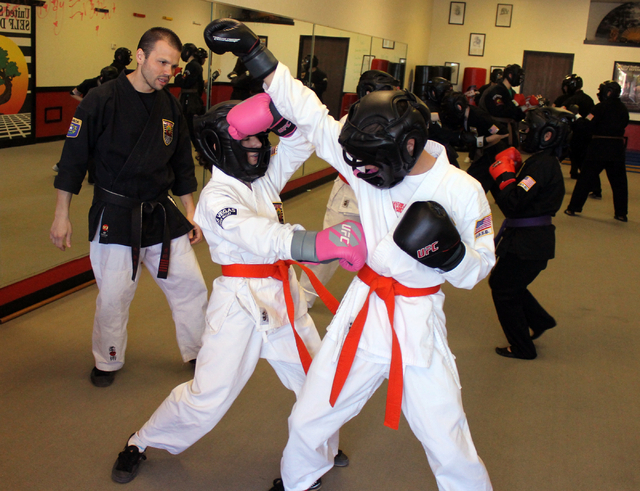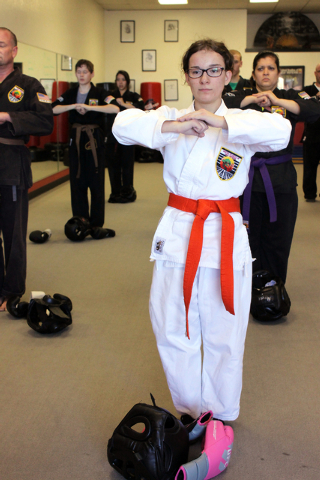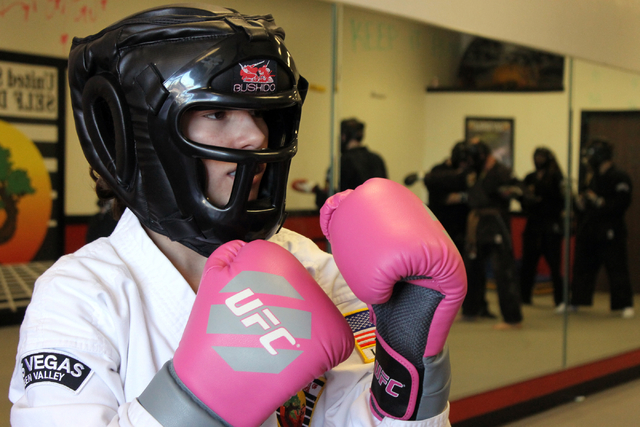Despite Asperger’s syndrome, Green Valley student is conqueror, not victim
She is the petite girl wearing her “Project Runway”-inspired outfit and signature smile. But her beauty is beyond skin deep. She befriends anyone and everyone and leaves a lasting impression in Green Valley High School classrooms. She’s Anna Joy Tanksley, 16, and a junior, and — unknown to many of her peers — she has Asperger’s syndrome.
Tanksley started her early years of school as any normal elementary student. From the start, she has always been studious and successful in school.
“I was really smart as a kid and used what they call ‘big words,’ ” Tanksley said. “I love to read and focus on my schoolwork. I’ve always just thought I was nerdy.”
Children with Asperger’s, a mild form of autism, are typically diagnosed at much older ages than children with other disorders, such as autism, said child psychologist Allison Kawa, featured on “Kids in the House.”
Although autism is generally detected in children 3 years or younger, children with Asperger’s are often diagnosed in their elementary years. The common stage is third or fourth grade because there is usually both an academic and social jump. For Tanksley, those signs came later.
“I wasn’t officially diagnosed with Asperger’s until I was 11 years old. But looking back, the symptoms of Asperger’s were there when I was little. I was sensitive to noise and things like birthday parties were really overwhelming for me,” Tanksley said.
Asperger’s is often mistaken for mental retardation, say researchers with the Palo Alto Medical Foundation. But individuals with Asperger’s often do well in school.
The distinction of the disorder lies in social skills.
It was in her first year of middle school that Tanksley began to notice she was a little different from the average sixth-grader.
“I was having trouble with middle school coping,” Tanksley said. “It was a chaotic environment for me because there were so many kids. It was a culture shock.”
Later that year, Tanksley was scheduled to see a neurologist for vision problems. But what was considered to be another normal eye doctor’s appointment led to her diagnosis for Asperger’s.
The neurologist noticed in Tanksley symptoms of the syndrome and testing confirmed those suspicions.
The news, however, did not negatively affect Tanksley or her family. Instead, they accepted it together and continued moving forward. The news actually provided some relief for Tanksley.
“When I was diagnosed with Asperger’s, I wasn’t devastated and neither was my mom. It was more of a relief because I felt, ‘OK, I’m not just a weird kid. There’s actually something that makes me weird,’ ” Tanksley said.
As she has progressed to high school, each year brought new social challenges for Tanksley. English teacher Rosemary Smith, who has been Tanksley’s teacher both her sophomore and junior year of high school, has even witnessed a change in the short time of one year.
“In the past, she has come to me if she’s been upset because an assignment isn’t finished yet. I give her extra time though because it is written down in her IEP (Individualized Education Program). But she has always come to me and let me know.
“Her mother used to do it for her in the beginning of sophomore year, but now she does it herself,” Smith said.
Any child with special needs in a public school has an IEP document specifically for them. The child’s parents and educators compile the plan to ensure the student receives special services.
But Tanksley rarely needs those services. Smith recalls Tanksley has only had to step outside of the room once, in sophomore year. She asked for a few minutes to calm down and collect herself and then rejoined the class.
At the beginning of this school year, Tanksley’s junior year, Smith said she has seen a significant improvement in her student.
“She didn’t voice her opinion as much last year,” Smith said. “She’s made a lot of progress in group situations and speaking up for herself. I’m very pleased.”
Partner and group activities are a normal stressor for Tanksley. People with Asperger’s often have a difficult time with communication, such as reading others, interpreting tones or expressions or understanding humor.
“I can’t tell what people mean when they say things sometimes,” Tanksley said. “I’ll think, ‘What does that facial expression mean?’ I have trouble processing expressions and that’s what makes social situations stressful. It gets frustrating.”
Tanksley acknowledges that conversations are not the only thing she overanalyzes. She cannot help criticizing herself in day-to-day interaction with others.
“Part of controlling my Asperger’s is knowing what to say at what time instead of just blurting out what comes to mind. I have to work on suppressing my temptation to interject in a conversation. I have to watch when to enter my statement and not interrupt someone. I don’t pick up on those cues to speak. It’s a little tricky,” Tanksley said.
Over the years, she has worked on smoothing out the creases that — although minor — are important to her. She has practiced maintaining eye contact and focusing on what the other person says.
Because her communication skills are not perfect, Tanksley works on improving them. She has overcome some challenges already.
“I can suppress my Asperger’s symptoms well so some people can’t tell I have it unless I tell them. But I still make social slips. It is hard for me to communicate with people,” Tanksley said.
Something that has helped Tanksley practice her social skills is being involved in her school’s theater company. Although she enjoys working behind the scenes, creating props and setting up the stage, she participated in the company’s first play of the year, “Shakespeare’s Women,” and performed a sonnet solo onstage.
Although it is only her first year in theater, she has big plans: future movie director. She believes that her Asperger’s has played a significant role in choosing her career and will help make her successful.
“People with Asperger’s are very visual and when they see something they are able to replay it back in their minds. Because of that and my imagination, I can set up scenes in my head — what the actors are saying, what they look like, their facial expressions, the background. Being a movie director would be the best job for me because of this talent I have, and because I enjoy writing,” Tanksley said.
Others admire her willingness to put herself out there in social situations — from acting onstage to interacting with her classmates — and have seen the results.
“She’s grown up a lot. There is a maturity there that is undeniable,” Smith said. “She has something to say; she has something to contribute. I’m very proud of her for doing that.”






















